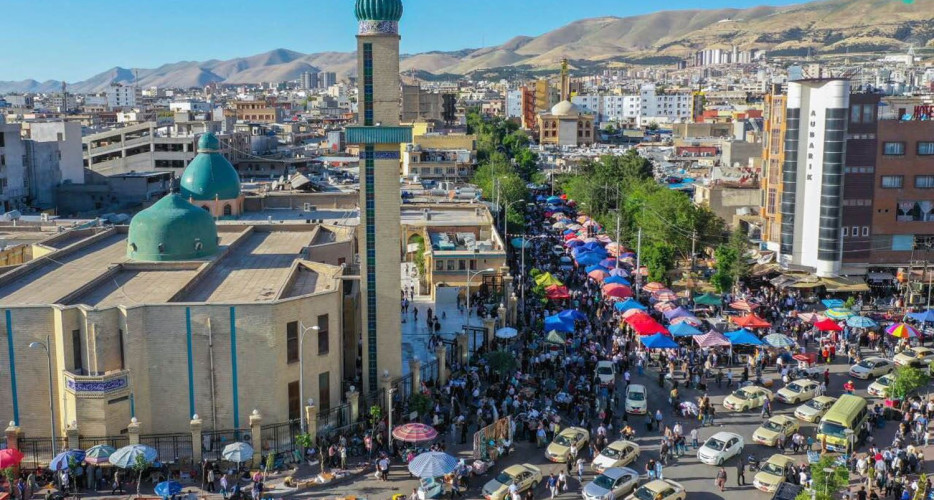
Peregraf
The Kurdistan Region’s market is eyeing revival after Erbil and Baghdad reached an agreement to resume oil exports, ending a 30-month halt that plunged the Region into a deep financial crisis. Oil once again flowed this morning through the Iraq–Türkiye pipeline to Ceyhan port, marking a breakthrough in energy and political relations.
For many in the Region, the development has raised cautious optimism. Ahmed Ali, a civil servant in Sulaymaniyah, said he is awaiting news of the arrival of July’s delayed salary from Baghdad. “We are definitely happy with this agreement, hoping it will end the salary crisis,” he told Peregraf. “But we are also hesitant that it might be temporary, and problems could arise again.”
Public trust remains fragile. “They have announced agreements many times before, but the problems continued and the financial situation remained as it was,” Ahmed added.
The dispute between the Kurdistan Regional Government (KRG) and the federal government over oil and finances is not new. Since the KRG began independent oil exports in 2014, Baghdad responded by cutting the Region’s budget, pushing employees into years of irregular salaries, deductions, and deferred payments.
“Iraq got what it wanted—control over the sale of Kurdistan’s oil and its revenues. Now it has no more excuses and must send our salaries,” said Layla Hassan, a teacher in Erbil who is owed three months’ salary this year. She stressed that “both governments must understand that people’s situation is very bad, and no disagreements should be a reason for not paying salaries.”
For nearly a decade, salary distribution has been one of the Region’s most pressing issues. Between 2014 and 2019, the KRG introduced “savings” policies, withholding 10 to 70 percent of monthly salaries. Twelve salaries were never paid in full, and more than 30 were distributed with cuts. The uncertainty has left many families struggling, and the withheld wages remain a source of grievance.
The economic consequences have rippled into the marketplace. “Unpaid salaries have a direct impact on the market, weakening our business significantly,” said Kawa Ahmed, a shopkeeper in Sulaymaniyah. “People only buy what they absolutely need, and many purchase on credit.” He added that while he hopes the new oil deal will bring recovery, “it will take months for the market to revive.”
Under the new agreement, the Kurdistan Region’s oil—about 190,000 barrels per day, with 50,000 reserved for local consumption—will be exported via Iraq’s State Oil Marketing Organization (SOMO). Revenues will be deposited directly into the federal treasury, with salaries for KRG employees to be funded from those earnings.
Prime Minister Masrour Barzani said he spoke by phone with Iraqi Prime Minister Mohammed Shia’ al-Sudani to finalize the deal. Both leaders hailed the resumption of exports as a “significant achievement” benefiting all Iraqis. Barzani said the two agreed to secure the Kurdistan Region’s share in the 2026 federal budget and discussed the importance of finally passing Iraq’s long-delayed Federal Oil and Gas Law.
“We emphasized the necessity of finding a radical solution to the issue of salaries and entitlements of the Kurdistan Region’s citizens,” Barzani said, noting that both sides pledged to ensure the payment of this year’s wages.
Al-Sudani, for his part, highlighted “promising economic opportunities” that could drive development across Iraq, from Basra to Kurdistan. The leaders also discussed advancing the Development Road project, with Baghdad expected to dispatch a committee to Erbil soon.
Exports had been halted on March 25, 2023, following an arbitration ruling in Baghdad’s favor against Ankara over the pipeline. The stoppage removed around 230,000 barrels per day from global markets and deprived the Kurdistan Region of vital revenues.
The new agreement, consisting of six articles and a preamble, is seen by officials as both a relief for public sector employees and a step toward stabilizing Iraq’s place in international energy markets. Whether it will finally end the salary crisis in Kurdistan, however, remains the question on the minds of its 1.2 million employees.